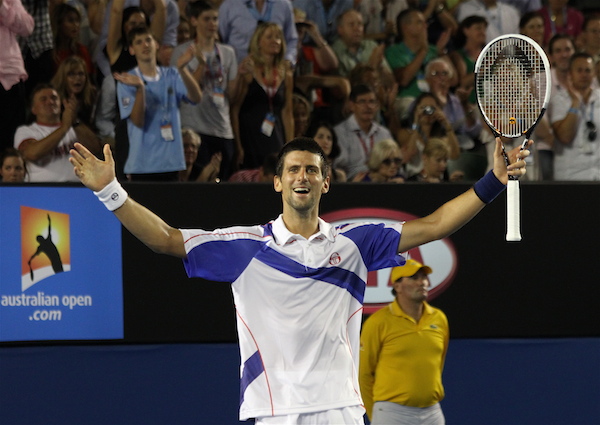Dear Sports Fan,
What’s up with yous? No posts for more than two weeks?? What are we, chopped liver?
Dear Sports Fan Fan
Dear Dear Sports Fan Fan,
Apologies for the long interregnum between posts. We will be trying to ramp back up to close to a post a day in the coming week or two!
Today I’m going to repost an article that Brian Phillips wrote for Grantland.
In it he recaps the amazing tennis match from Saturday in the U.S. Open semifinals between Novak Djokovic and Roger Federer. In it he describes how Djokovic survived two Federer match points and came back to win the match. He wonders about the meaning of this:
We want athletes to be able to explain sports. Sport, at its most basic, is about physically realizing intentions — calculating the angle, plotting the spin, executing the shot. So surely the people who have the intentions, the people whose inner lives sport is expressing in some complicated way, are in the best position to tell us what really happens on the court. And to a certain extent that’s true. But one of the reasons it’s so scary to imagine going into the postmatch press conference as a loser is that it’s not entirely true. What happens during a match may concern you to an emotionally devastating degree, but what happens can also turn on tiny fluctuations of chance so complicated that they are astoundingly difficult to articulate — minute physical differences that fall within any conceivable margin of error, emotional swings that could have gone either way and went against you, who knows why. These sorts of breaks are often monstrously unfair. And as with The Shot and The Confrontation, they tend to take on outsize importance in matches that are otherwise very close. Meaning that the greatest contests, the ones whose outcomes are most exalting for the winners and most devastating for the losers, are the ones most likely to be decided by infinitesimal turns of luck.
I have to say that I think he’s taking a little away from the greatness of the match and the greatness of that moment. Let’s watch it:
What I see in Djokovic’s face before the shot is someone who is resigned to his situation as he sees it. He knows that he has only a small chance of winning and he knows exactly what that chance is. He knows that his only hope is to take a low-percentage chance. He’s going to guess — to over-commit to where Federer might serve. If he’s right he’ll be able to win the point decisively. If not, Federer gets an ace and the match is over. Here’s where the greatness comes in — by this point they have been playing for over four hours. Djokovic has seen 162 Federer first serves. They’ve played 22 other times before Saturday. Without a coach talking in his ear, or a catcher flashing signs at him, Djokovic has to decide what gamble to make. Does he commit outside or inside? How many steps behind the base-line should he be? Should he return cross-court? Facing defeat in front of thousands of people, exhausted by four hours of tennis in the hot sun, annoyed at a crowd which has supported his opponent all day, Djokovic makes up his mind… and he’s right.
Sure it was lucky — but it was lucky like Larry Bird was lucky when he stole Isiah Thomas’ inbound pass, like Muhammed Ali was lucky not to get knocked out while he was rope-a-doping George Foreman.
Ezra Fischer

